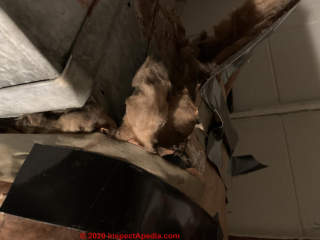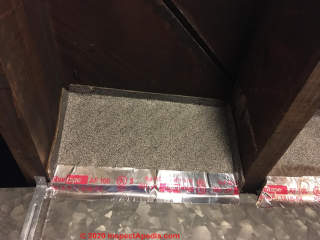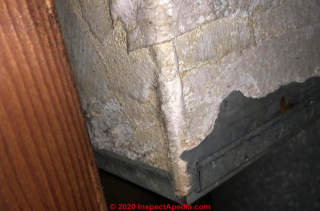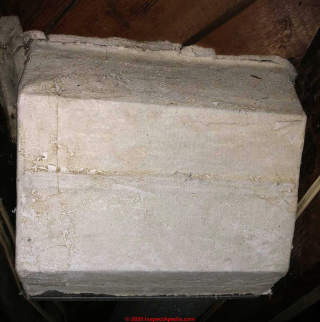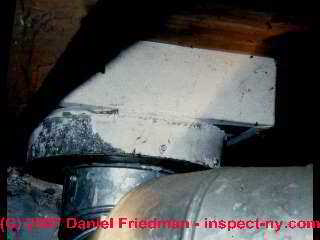 Asbestos HVAC Duct & AHU FAQs
Asbestos HVAC Duct & AHU FAQs
Q&A on Asbestos In Heating and Cooling Duct Work
& Air Handlers
- POST a QUESTION or COMMENT about asbestos materials on or inside of heating or air conditioning air ducts or air handlers & blower units
Questions & answers about the presence of & hazards associated with asbestos in or on HVAC ducts (air ducts or heating and cooling ductwork) or inside the air handler (blower unit) itself is a possible hazard.
This article series describes the inspection of heating and air conditioning ducts for visual evidence of asbestos materials in or on HVAC ducts.
Page to photo: white asbestos paper used as an insulating wrap on the exterior of an air supply register box.
InspectAPedia tolerates no conflicts of interest. We have no relationship with advertisers, products, or services discussed at this website.
- Daniel Friedman, Publisher/Editor/Author - See WHO ARE WE?
Asbestos Materials on or in the Air Conditioning or Heating System Duct Work
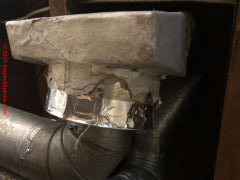 These questions & answers about the hazards of asbestos on or in HVAC ducts or air handlers were posted originally
These questions & answers about the hazards of asbestos on or in HVAC ducts or air handlers were posted originally
at ASBESTOS DUCTS, HVAC - be sure to review that article.
On 2020-12-26 - by (mod) -
That does look like asbestos paper duct and register wrapSee advice at ASBESTOS PAPER INSULATION on DUCTS
On 2020-12-26 by Willy
Found this tape [Photo above] around heating register and I’m concerned if that is a asbestos issue. House is old
On 2020-11-08 by (mod) - damaged fiberglass on 1950s ductwork
Amber
The only insulation I see in your photo of looks like pink or white fiberglass. That may be an Owens Corning product.
It's damaged and shedding.
On 2020-11-08 by Amber
We had our ductwork cleaned out a couple of weeks ago. Afterwards I went to the basement to check out the area. What kind of insulation and brown paper is this? I can’t find the paper anywhere. Brown on both sides with a black layer between.
Home was built in 1958. Tile, cork flooring & mastic all negative for asbestos but worried about this.
On 2020-11-03 by (mod) - cardboard ductwork?
That looks like cardboard with a printed paper surface or possibly a foil surface.
At ASBESTOS PIPE INSULATION
https://inspectapedia.com/hazmat/Asbestos_Pipe_Insulation.php
in the first photo at the top of that page you can see what corrugated asbestos "paper" insulation looks like - typically rather gray in colour.
On 2020-11-03 by Ariel
Does the piece of cardboard in this photo look like something that is likely to contain asbestos? It's part of the ductwork in my house. I need to remove it.
On 2020-07-06 by Anonymous
Not likely.
On 2020-07-06 by Condo
I have a 1986 Carrier Weathermaker SX furnace. Would there be asbestos used inside the furnace? Would there be any asbestos in the gaskets or insulation? Would there be asbestos near the pilot light or burners? Would there be asbestos anywhere inside the furnace?
On 2020-06-06 - by (mod) -
Susan
Thank you, that's an interesting question about cleaning asbestos-contaminated HVAC ducts and air handlers. Generally hard metal surfaces can be cleaned. If your actual ductwork is made by fiberglass panels for example it's unlikely that those can be completely mechanically cleaned.
On 2020-06-03 by Susan
If asbestos fibers have been sucked into our HVAC's air handler, as well as into a Trane all-in-one gas package, can they be safely cleaned of asbestos? Or do they need to be replaced? What about ductwork?
On 2020-04-23 - by (mod) -
Rhonda
If you see this sort of white paper wrapped on the outside of your air ducts or air supply registers in the accessible areas of your home, that's pretty good evidence.
If none of your duct work is accessible, as this paper insulation was normally present on just the duct exterior, the exposure risks are pretty low.
To go further, in that case, you'd need a technician with an HVAC duct inspection camera to examine the whole duct system interior (where this material is rarely found).
How to find out if our basement has this in it. House was built in 1959
On 2020-02-05 by (mod) -
Glad to work together - it helps us both.
Daniel
On 2020-02-05 by Josh
Hey, glad if I can help other readers out in any way. I sent it in for testing and they confirmed it to be asbestos containing. So you were on the money, Asbestos paper duct wrap and the other strips are asbestos containing tape. Thanks again for your help in identifying it. I appreciate it. Take care and all the best to you.
On 2020-01-02 by (mod) -
thank you for the follow-up that will certainly help other readers
On 2019-12-30 by Duct wrap
Thank you. I had my suspicions. I definitely appreciate it. I’m going to have some tests run. Being in an industrial steel town with heavy use of asbestos in general, along with the home being built in the 50s, I’m almost certain that it is. I’ll try to remember to come back and leave a comment to let you know once testing confirms it. Thanks again, and take care.
On 2019-12-23 by (mod) -
Josh that certainly looks like asbestos paper type duct wrap.
On 2019-12-22 by Josh
On 2019-12-22 by Josh
Another image of the side of it.
On 2019-12-22 by Josh
What do you think? Asbestos or no? The same material lines the parts where the segments come together.
On 2019-11-17 by (mod) - cost of a new heater in the U.K.
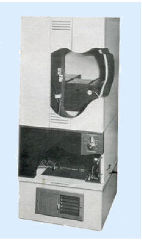 Kat
Kat
I'm guessing by the name of your heater that you're in the U.K. where the cost of a new heater installation (without heat distribution by radiators or ductwork) in a small house is about £2000.
So you could certainly be in that ballpark, to which extra costs will be added depending on accessibility and asbestos details.
I'm sorry but we can't give you a more-accurate cost-to-remove estimate for that Creda Comfortair heating system;
My general excuse is that we do not sell anything. No products, no services. InspectAPedia.com provides building and environmental diagnostic and repair information. In order to absolutely assure our readers that we write and report without bias we do not sell any products nor do we have any business or financial relationships that could create such conflicts of interest.
My more-specific excuse is that the cost of removing any piece of HVAC equipment in any building varies enormously according to the specific situation.
Just imagine, for example, having to tear out a heater that's installed in a utility closet with an access door too small to move equipment through the opening, on the fifth floor walk-up to a flat in a large city where there is no nearby parking, and compare that with removing the same equipment from the floor of an open garage in a small town at a home with a nice wide driveway.
To the access variables we'd add the cost of handling asbestos materials which varies by country and city and regulation as well as by the location, type etc. of the asbestos.
Un-hooking a cement-asbestos board secured to a ceiling by four screws to serve as an old fire barrier is trivial compared with cleaning up a crawl area where somebody chopped up asbestos duct or pipe insulation and dropped it all over the ground.
For other readers, the Creda Comfortaire is (typically) an electric storage heater like this Creda Comfortaire 75184 (AB5/37) unit advertised by www.storageheater.co.uk/ - shown above.
On 2019-11-17 by KAt
Hi,
We just bought a flat in a building from the 1960s, and just finished the asbestos survey, which found asbestos on floors and ceiling in the entire flat as well of course on the doors of the build-in creda Comfortaire warm air & water heating system.
The flat is small - 45 square meters, and we are now considering the removal of the creda system, it has air vents on the ceiling that are sticking out creating an uneven surface.
Can you give me an estimate of costs related to the disposal of the Creda unit as well as those ceiling and wall air vents?
Any information would be beneficial.
Thank you!
On 2019-09-20 by (mod) -
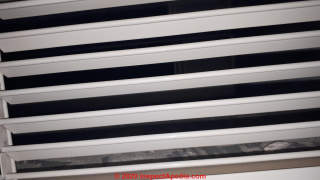 Emanuel I can't say from the photo what we're seeing.
Emanuel I can't say from the photo what we're seeing.
If you mean that white deposit near the bottom of the image, could that not be drywall dust?
How old is the building?
In what country and city is it located?
Those answers can help you figure the probability that there is asbestos used in some product in the Building.
On 2019-09-20 by Emanuel
Hi, I noticed this strange material in this ac vent. Could it be asbestos? It has a grey/white colouring.
Question: is there an asbestos risk in this supply air duct lined with acoustic ceiling tiles?
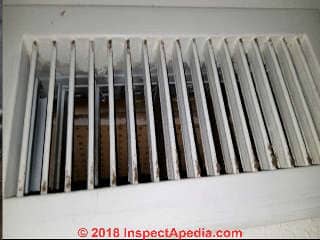 Can you tell me if these tiles contain asbestos?
Can you tell me if these tiles contain asbestos?
It's most concerning to me because it is inside the air ducts where the moving air is on the vent ends. When we moved in we all noticed an increase in coughing. I asked the landlord to have the vents cleaned.
He used an unlicensed service provider on that and every project since.
I saw the tiles in the handle area but the vents blow air which moves and makes me feel very concerned. I have a 2yo, 4yo and 6yo I feel like I have failed at protecting in a way.
My landlord didn't tell me anything and he is trying to sell me the house. It's been one thing after another.
This is a supply air duct for the living room and sunroom in my home. - Anonymous by private email 2018/07/21
Reply:
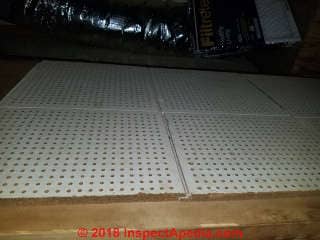 Your ceiling tile photo looks like a cellulose-based product - and an old one. A few of those could have been cross-contaminated with asbestos. Avoid making a dusty mess or if you must demolish it, have a sample tested.
Your ceiling tile photo looks like a cellulose-based product - and an old one. A few of those could have been cross-contaminated with asbestos. Avoid making a dusty mess or if you must demolish it, have a sample tested.
Old acoustic ceiling tiles inside of air ducting? Sounds like a bad idea to me. Even without asbestos that material collects dust, debris, and if damp can grow mold or pathogens, and if damaged can shed debris that's at the very least likely to be a respiratory irritant.
And IF the acoustic tiles shed asbestos-containing debris, that's right in the air path, delivering airborne asbestos to the occupied space.
It looks like supply - making this even more odd. I would not just spray a sealant, I'd probably plan on replacing the ductwork. But if someone lined a wall or floor cavity with ceiling tiles to make a DIY "insulated" return duct, that'll be a bit more work as it may be impossible to revise the return without removing the tiles.
In that case I'd have a sample tested.
See ASBESTOS TESTING LAB LIST Since if it is confirmed to be asbestos-free the cost will be much less.
On 2018-03-07 by (mod) - What is the Probable Hazard Level of Asbestos on Un-Disturbed Residential HVAC Ducts?
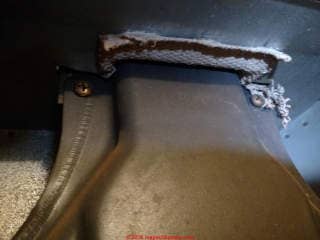 Reply:
Reply:
My advice, to rest your concern, is to collect a representative dust sample and have it analyzed by an asbestos test lab.
See ASBESTOS TESTING LAB LIST
Anything else is pure speculation.
Following up on other questions you raised:
Question: Should the dust sample be tested using TEM method? (I know its more expensive, but I want to do this right).
Reply: IMO any certified, licensed microscopy/environmental lab can use any of several methods including PLM (polarized light microscopy) that are perfectly reliable and adequate for detection of the presence of asbestos. TEM is not necessary to reliably identify asbestos.
Question: I will find "old dust" to degree possible. But should I also get dust samples from inside my HVAC? My house is 2008, but if there was asbestos dust in the contaminate that came into our house, is this where it would most likely settle?
Reply: Candiate dust samples include a horizontal surface that has not been wiped clean and is in an area where you spend much time, and yes, an inside surface of the air handler or ductwork, perhaps in the return plenum, or from a filter surface.
Question: Would asbestos dust still be present 5 years later?
Reply: Asbestos dust would not be expected on surfaces that have been cleaned since the *possible* release of asbestos-containing dust in the home but would easily be present in old dust samples from the same era. It doesn't evaporate nor disintegrate.
Question: Is it true that most homes built in the asbestos-era (ie. 60s or 70s) would have asbestos dust in the HVAC/ducts from original home construction? Has anyone ever tested this 'theory'?
I'm not aware of research focused exactly on your question but will pursue it.
IMO it is not likely that there would be meaningful levels of asbestos in house dust in a home and probably not a detectable level of asbestos in dust in a home attirbutable to asbestos paper duct wrap on an HVAC system if that wrap was not disturbed, cut, ground, sawn etc. to make a dusty mess.
My OPINION is that it is not likely that hazardous levels of asbestos will be detected in residential structures in which HVAC ducts are insulated with asbestos-paper that has not been significantly disturbed such as by grinding, sawing, chopping, or aggressive demolition and renovation work.
HVAC duct insulation that used asbestos was typically in the form of asbestos-paper on the duct exterior and on the exterior of supply register boxes as illustrated in the article above. On rare occasions I have found corrugated asbestos-based paper insulation on the inside of the heating system air handler (on an old Williamson furnace) - a location of asbestos that forms a more-hazardous situation.
Research on hazard sof asbestos exposure from residential HVAC ducts:
I have not found specific articles researching the hazard of airborne asbestos attributable to un-disturbed asbestos paper or other asbestos insulation on HVAC ducts in residential buildings. The following research is pertinent:
- Zoloth, Stephen, and David Michaels. "Asbestos disease in sheet metal workers: the results of a proportional mortality analysis." American journal of industrial medicine 7, no. 4 (1985): 315-321.
Abstract:
The results of a proportional mortality analysis of a cohort of sheet metal workers who have only intermittent exposure to asbestos demonstrates a significant excess of cancer at the three sites most frequently associated with asbestos: lung, colon and rectum, and the mesothelium.
No excess nonmalignant respiratory disease was detected.
These data strongly suggest that significant asbestos-related disease is present in populations with secondary exposure to asbestos and emphasize the importance of considering possible asbestos-related disease when treating patients with a history of employment in the construction industry. - Smith, R. Jeffrey. "Asbestos Can't Be Overlooked When Renovating." Journal of Management in Engineering 16, no. 2 (2000): 29-30.
This article warns of asbestos-containing materials that may be disturbed during building renovations; it is not specifically focused on HVAC duct asbestos.
On 2018-03-07 by (RH) - Is it reasonable that asbestos dust would gather in air ducts of older homes when they were built,
I have a unique question and I'm hoping you can shed some light on it.
Almost 5 years ago, we had the air ducts cleaned in our house. The house was built in 2008 and would not contain asbestos. However, there was a malfunction with the duct cleaning equipment that resulted in a lot of old debris and dust from their truck-mounted vacuum (from previous homes) entering our home. There was a lot of it. We wiped/vacummed it up and didn't think much of it.
However, recently it was mentioned to me that air ducts in older homes would contain asbestos dust either from renovations, or from original construction of the home, or even through cracks in duct-work wrapped in asbestos-containing insulation.
As the dust/debris that entered our house would have been partially from older homes, could it have contained asbestos? Could it still be in our home almost 5 years later?
Is it reasonable that asbestos dust would gather in air ducts of older homes when they were built, and would it actually be significant enough to be of concern that old dust was blown into our house?
I have discussed with a few people and have received very different answers. I have been looking at your website which is very useful, and thought you might be able to break down this risk for me.
Note: We had very young children in the house at the time.
Thanks for any info you have
On 2018-01-16 by (mod) - should 35% white chrysotile asbestos HVAC duct boot wrap on a duct supply register be removed?
Pat,
IMO no one with any honesty or sense should claim a for-sure answer such a question from a mere e-text?
A thoughtful answer would need information about your building, about the asbestos found, about the condition of the material, its location, exposure to damage or traffic, about the thoroughness of your survey.
Generally the safest course is to leave such materials alone, perhaps covering or encapsulating them.
But there are of course exceptions depending on site conditions. I would insist that the company paid to perform an "asbestos" survey give you more-helpful information as they, the purported experts, have actually seen the site.
I apologize that I can't give a more direct answer but I just can 't bet your money and your health on so little information.
On 2018-01-16 by Pat Anderson
I property manage a property in California. We have had an Asbestos Survey done.
It shows that the White Register Boot Wrap contains 35% Chrysotile.
Should this be removed?
Thank you for your help.
On 2017-11-08 by Teri - some kind extremely fine dust that blasts out of the register Vents
We have some kind extremely fine dust that blast out of the register Vents and every time the Heat or air conditioning comes on. I went down in the basement to check it out and I would say two thirds of all of the Ducks down there look like the pictures of asbestos.
We were told this house was built approximately 1925 we have brought it to the attention of the landlord as this is a rental property.
By 81 year old mother has lived here for the last 6 years with this particle issue, I have been here almost a year. We have no idea who to contact to have this checked out but we do believe it is causing health issues. HELP!
On 2017-11-08 by Mac
I have a vacation home with a 30 yr old broken attic heater that has ducts wrapped in asbestos. The estimate to replace the heater & remove the asbestos is over $12,000, we'd like to wait till next year to replace it & use floor heaters in the interim.
But do we need to seal off the heater & return vents that have access to these asbestos airspaces? Thanks
On 2017-09-25 by (mod) - asbestos in Florida buildings built in 2003?
Vicky,
It would be extremely unusual for anyone building in Florida in 2003 to have been using an asbestos spray anywhere on in or around your home.
On 2017-09-25 by Vicki
I have a home in Florida built in 2003. The end of the airduct supplying air to the room is a mesh material.
This is up positioned against the air filter. It appears to be sprayed with a white material that looks like something that could contain asbestos. Was asbestos allowed in residential construction during this time?
On 2017-05-28 by (mod) - cement asbestos transite pipe or ducts
Yes that might be a cementious material - transite asbestos cement pipe.
On 2017-05-28 by Leon Gurevitch
I have come across a 3- 1/2 x 12 inch duct in a wall. It is cementatious in the interior with walls anout 1/2" thick.
The exterior has galvanized metal compketely wrapped and will slide up and down. This section is 6 feet long and not connected to anything. House was built in '34 and remodeled in '63. Does this sound like it could be asbestos in nature?
On 2017-05-19 by (mod) - usual appearance of asbestos-containing duct insulation
Rob:
If there is asbestos on HVAC air ducts it's usually a paper material on the duct exterior.
On a supply duct, such "insulation" doesn't tend to put asbestos in the air path since the duct interior is pressurised - it wants to blow OUT of any cracks or openings. YOu can leave such material alone or to be safest, cover - small areas are easily covered with foil adhesive tape.
If there is asbestos paper on the outside of return ducts, ONLY if the paper is at or covering holes or openings in the return duct, might those try to draw a tiny amount of asbestos paper fragments into the duct interior.
Generally you could follow the same advice as for supply ducts.
In the U.S. the EPA points out that the lowest risk from most asbestos materials is to leave them alone, or leave in place covered-over.
On 2017-05-18 y Rob
If my heating and air ducts I have asbestos on them and I take them with asbestos tape is it safe or is it just best to remove it
On 2017-04-12 by (mod) - inspect ducts for asbestos
David,
You will want to start answering the question you pose by inspecting and identifying the duct materials used in the HVAC system as well as in the air handler itself.
You don't give the building country, state, province, city, location, but if you're in the U.S. it'd be quite unusual but not impossible for those materials to appear in a 1984-built home.
On 2017-04-11 by David
I have a house built in 1983/84. We have a ducted reverse cycle air condtioning. The unit has probably been changed but im not sure about the ducts.
Just wondering if the air con is safe to use, are there any asbestos fears here?
On 2017-03-31 by Anonymous
The extent of asbestos Hazard for the case you describe would probably depend on the location of the damaged asbestos material as well as the amount
In any event if asbestos is damaged or soft and friable and is an area of the building where it is likely to be tracked or carried or blown into occupied space, then it would make sense to remove the loose or damaged material and at the very least to encapsulate or protect the remaining material.
On 2017-03-31 by Martha
My question is at point does the presence of crumbled asbestos becomes a concern?
If an asbestos wrap material on a heating pipe has become deteriorated and frayed and some of the material has crumbled onto the floor of the furnace closet - is that, in and of itself, considered a health risk situation? Thank you for your assistance.
On 2016-11-03 by Michelle
Hi, we have an original 1978 HVAC system with the transite pipe in two story home and we need to put in a new gas furnace.
A friend that does HVAC suggested that one way to remedy the problem is to run a 2" pipe through the existing transite so we dont have to dispose or modify it
. i realize this is probably not standard or to code, but is it a safe/effective solution?
On 2016-05-11 by (mod) -
Kevin, near the top of ASBESTOS DUCTS, HVAC see the live link
ASBESTOS PAPER INSULATION on DUCTS and also
see VIBRATION DAMPENERSor more discussion of this possible asbestos source.
On 2016-05-11 by (mod) -
Kevin,
(and no we were not offended by your challenge - working together makes us smarter - so thanks for asking and for arguing)
I agree that in most situations the asbestos paper duct wrap on HVAC ducts is not particularly friable.
In our separate article discussing that product we suggested that if the paper is on the ***OUTSIDE*** of an HVAC ** SUPPLY AIR ** duct and in good condition not subject to damage, it's best to leave it in place, perhaps painting it or protecting it from damage.
The paper duct wrap becomes a possible hazard in situations that I can tell from your care in discussing the matter will be somewhat obvious:
- the paper material is being wet, frayed, damaged, and tracked into the occupied space (very possible hazard)
- the asbestos paper material is inside of an air handler or air duct (possible risk depending on condition, sealant used etc)
- the asbestos paper is or has been wet, damaged, frayed, and is on the outside of an HVAC return air duct in a location where the negative pressure in the duct system could draw asbestos debris into the HVAC air handler where it may be chopped in a blower fan or redistributed to the occupied space.
I would like to see photos of the material you have - use our page top or bottom CONTACT link.
I agree that common sense and matters of degree deserve an important role in handling asbestos and that there has often been far too much panic that has often led to unnecessary asbestos removal that caused far more airborne asbestos exposure than if the material had been left alone.
I can't say why ultimately EPA banned some materials and ignored others, but I suspect that the reasons included a melange of science and political and economic pressure from the industry.
On 2016-05-11 by Kevin - EPA seems to be saying that friable asbestos materials ARE certainly dangerous.
To clarify, the EPA seems to be saying that friable asbestos materials ARE certainly dangerous. But the thin tape-like "pipeline wrap" is no longer banned, apparently because it is either not friable, or only minimally so.
I can supply photos of mine, if you like. It has been on my duct work for decades, and is holding up well. Could this all be a simple matter of degrees? I.e., asbestos pipeline wrap, of the thin masking-tape style, doesn't pose enough of a health risk to be banned?
On 2016-05-11 by (mod) -
Kevin, we do not read the same page drawing the same conclusions as you.
Indeed under the modified asbestos ban some products are "not-banned" but below is a list of current-ban.
Watch out: While I agree that some companies profit from inappropriate "asbestos scare topics" (search InspectApedia
for ENVIRO-SCARE - PUBLIC FEAR CYCLES to read details), your position calling asbestos-containing items in homes "Non-issues" fails to recognize the hazard caused when friable asbestos materials are disturbed, making high levels of dust spread widely through a home.
The fact that a friable asbestos-containing material is or is not prohibited by the US EPA does by itself not change the potential hazard if such material is disturbed in or around buildings.
Keep in mind as well that there are industries who continually press against government regulation intended to protect the public in order to serve their own economic interests.
The result is that one cannot assume that what is "government regulated" is necessary the end of informed discussion about actual risks to consumers any more than one can assume that because we have policemen that there is no crime committed.
The following banned uses of asbestos are cited at the very US EPA page you quoted.
Banned asbestos products and uses
Under the Toxic Substances Control Act (TSCA): Banned Manufacture, Importation, Processing and Distribution in Commerce of Certain Asbestos-containing Products
Corrugated paper
Rollboard
Commercial paper
Specialty paper
Flooring felt
In addition, the regulation continues to ban the use of asbestos in products that have not historically contained asbestos, otherwise referred to as “new uses” of asbestos.
Under the Clean Air Act (CAA): Banned Asbestos-containing Uses
Asbestos pipe insulation and asbestos block insulation on facility components, such as boilers and hot water tanks, if the materials are either pre-formed (molded) and friable or wet-applied and friable after drying.
Spray-applied surfacing asbestos-containing materials
Spray-on application of materials containing more than 1% asbestos to buildings, structures, pipes, and conduits unless certain conditions specified under 40 CFR 61, Subpart M are met.
Under the Consumer Product Safety Act (Consumer Product Safety Commission): Banned Products
Asbestos in artificial fireplace embers and wall patching compounds
On 2016-05-11 by Kevin - According to the EPA's web site, asbestos pipeline wrap is not even banned - not considered dangerous.
I am puzzled. According to the EPA's web site, asbestos pipeline wrap is not even banned - not considered dangerous. In fact, their own summary of the regulatory history of asbestos includes the following:
"In 1989, the EPA issued a final rule under Section 6 of Toxic Substances Control Act (TSCA) banning most asbestos-containing products. However, in 1991, this rule was vacated and remanded by the Fifth Circuit Court of Appeals.
As a result, most of the original ban on the manufacture, importation, processing, or distribution in commerce for the majority of the asbestos-containing products originally covered in the 1989 final rule was overturned."
The meaning seems to be that most of the situations discussed here on this page of inspectapedia.com are non-issues. Would a moderator or other expert care to read the following EPA web page and post a comment here? https://www.epa.gov/asbestos/us-federal-bans-asbestos#tsca
On 2016-01-23 by (mod) -
Jane: I don't have enough understanding of the situation to have an opinion.
On 2016-01-22 by Jane
Can asbestos u disturbed on heating flu be sealed with flex seal
On 2015-08-24 by (mod) - can asbestos ductwork be encapsulated?
Gary
On supply ducts as they are normally under positive pressure, if asbestos paper insulation is present I'd paint it and leave it alone, or I would replace the entire duct section if the asbestos is particularly damaged or vulnerable to damage. Duct replacement is probably cheaper than encapsulation by other means.
On return ducts I worry that asbestos might be sucked into the duct interior through openings at joints or perforations if the duct suffers from such leaks as well as from damaged, friable asbestos exterior duct wrap.
On duct interiors, supply or return, I would not expect to find asbestos: if I did I would replace the ductwork. There are spray encapsulants but I'd not trust that approach to remain sound over the life of the building, and I don't like leaving a problem in areas where people seldom check. above is OPINON
On 2015-08-24 by Gary
Can asbestos be safely encapsulated on HVAC duct work?
On 2015-07-09 by (mod) - use professionals to remove asbestos ductwork
If you actually have asbestos material that must be removed, most likely that needs to be done by a certified professional.
On 2015-07-09 by shelley
we had a company come in yesterday to get a new furnace and central air and its gonna be done next week.When the guy was here and looked at our furnace he noticed abit of aspestos around furnace.He is gonna safely remove it when they do the furnace and air.
My We need to get our ducts cleaned befor we put in new furnace.My question is can the cuct cleaners still clean my ducts with the aspestos around furnace.
Question: can I cover tears in asbestos water pipe wrap
I believe I have asbestos wrap covering my water pipes and heating duct work in my 1950's home. The wrap is in good shape, with the exception of a few tears here and there. The article says to leave it alone if possible.
Can I cover these tears myself to avoid airborne contamination with say a piece of duct tape and to avoid having to do total removal, which will probably present a greater health risk? I have a home gym down there and I am very concerned about the health risk especially since I run a fan sometimes. thanks - Diane 6/12/12
Reply:
Diane there are several procedures that professionals use to cover intact asbestos or presumed-asbestos pipe insulation; in addition to professionally sprayed encapsulants, we've seen good-condition pipe insulation that was simply spray-painted to form a harder skin and to bind any few loose surface particles; other encapsulators wrap the existing insulation with a new plastic or fiberglass covering.
Certainly I would not run a fan in a location that might distribute asbestos-suspect particles.
\And if there is evidence that the material has been disturbed or damaged in the past, even in small areas, damp wiping and HEPA vacuuming of the area surfaces might be appropriate both to remove suspect dust and to avoid distributing it when you later do run a fan of any sort.
Question: 1960 Sears Wall Furnace with corrugated asbestos paper insulation in the air handler
We have an older Sears wall furnace from about 1960 with the corrugated asbestos paper inside the air handler as you mentioned. Two years ago, the paper fell off its mount and lodged about an inch below the top of the exhaust grating, in the top few rows of holes.
We continued to use the furnace for the rest of that season, but haven't used it since. I'm curious if you feel this was a serious contamination risk (we've heard people say both possibilities) and if you have any suggestions about removal of the furnace or simply the asbestos paper.
Unfortunately, the furnace is in the middle of an open floor plan and will be very difficult to isolate from the rest of the house - Tim 9/28/12
Reply:
Tim I really can't assess the asbestos risk by just an email; one would need to inspect the system, perhaps performing some tests of nearby dust in the ductwork.
While one would be inclined from just your message information to advise against getting too excited, if the paper was in poor enough condition to fall apart, no one is going to bet their mortgage, kids education and car on assuring you that there was no risk of contamination.
The real flies in the ointment are the risk of having blown asbestos dust through a building's occupied space IF there was friable damaged asbestos anywhere in the air path - in that case test building settled dust, an approach that looks more thoroughly than just a momentary air test
- and second, even if you removed the asbestos material from the furnace, when you seek to replace it with something suitable, again, nobody is going to be willing to accept responsibility for the safety of the results.
Unfortunately what this has led to for the furnaces I've found that had asbestos built into the plenum and air path has been:
- In some cases the owner, recognizing the age of the system, didn't feel so bad at just replacing the entire unit
- In one case an owner had the asbestos corrugated paper removed and made up his own substitute, taking his chances on a non-warranted furnace.
Question: 1960 house with musty smell found black & yellow board insulation
I have a house that was built in 1960. We bought it about a year ago and it has a musky smell. Well this lead us to see what it looked like inside the ducts and heat pump. In the intake ducts it has this board type insulation that's black and yellow.
Also inside the heat pump it has insulation where the coil and blower is. Would there be a chance this insulation could be asbestos? It looks like it has been deteriorating for years which means we have been breathing this stuff. Im concern for my 2 year old. - Angela 10/7/2012
Reply:
Black and yellow fiberglass board insulation is not fiberglass, though if it's in poor condition you may have been blowing irritating fiberglass particles into the building air. A check of settled dust and of air might give an idea of how much dust there is and whether or not a clean-up is justified.
See FIBERGLASS HAZARDS for details.
Question: Asbestos was removed from our home but we're worried that the ducts were not cleaned
We have just finished having our asbestos professionally removed from our house. However, my husband looked in the furnace and ducts and they were not cleaned at the time of the abatement. We have entered the house a couple of times, are we at risk?? - Erin 11/18/12
Reply:
Erin
Maybe. If the ducts were clean before the asbestos job and if they were properly isolated, sealed and protected during the work you may be ok.
Question: how do I distinguish between asbestos & non-asbestos paper tape sealant on HVAC ducts?
Below someone said he had the "pale paper-like tape" tested and it turned out to be cellulose. I wonder: How do I get the material tested?
In my work as a weatherization auditor/inspector I often find a pale paper-like tape over the seams of some heating ducts in older homes that I have been told to consider as suspected asbestos.
A test was done on one of these and that sample turned out to simply be 90% cellulose and 10% fillers and binders, with no trace of asbestos. Was there an asbestos tape used in this way, or is there a way to differentiate between such tapes? - Ken Ray 11/7/11 & again from Jem 11/26/2012
Reply:
Jem & Ken Ray:
It's easy & inexpensive to send a small sample to any certified asbestos testing lab; The lab may suggest you wet or dampen the sample before snipping it so as to avoid creating any dust. See Where to Find an Asbestos Testing Laboratory - separate article. We also discuss asbestos test labs
at ASBESTOS FLOOR TILE LAB PROCEDURES. Typical lab cost is about $50.
For very small amounts of asbestos-suspect material it may make more sense to just treat the material as Presumed Asbestos Containing Material (PACM) rather than face the time delay and lab costs for tiny sample testing.
Appearance of Non-Asbestos paper tape seam sealers & coverings for HVAC ducts
There are paper like tape seams that do not contain asbestos - usually we see rectangular-grid spaced reinforcing fibers in the newer tapes;
Appearance of asbestos-paper tape seam sealants & duct coverings
Take a look at how the tape has been adhered to the surface it is covering. Asbestos paper or paper tape strips used on duct seams and on some pipe joints was wet and then applied in strips to seal both metal HVAC ductwork exteriors and to cover some asbestos pipe joints.
You won't (at least in my field experience) see fiberglass reinforcing seams in asbestos paper tape, and the asbestos-based paper tape may be uniformly dimpled over its surface from rolling in the mill.
The edge of asbestos based paper tape is thicker (about 1/16") than modern white seam tapes and was not self-adhesive.
Finally, I wouldn't expect to find asbestos based seam tape on top of or covering non-asbestos pipe or duct insulation itself.
But the opposite is NOT true. That is, in order to cover damaged or friable asbestos pipe or duct insulation, someone might have applied a newer covering material.
...
Continue reading at ASBESTOS DUCTS, HVAC or select a topic from the closely-related articles below, or see the complete ARTICLE INDEX.
Or see ASBESTOS DUCTS, HVAC FAQs-2 - more-recent questions and answers and photos of asbestos suspect materials in heating and air conditioning ductwork
Or see these
Asbestos HVAC Duct Articles
- ASBESTOS HVAC DUCTS - Guide to Identification of Asbestos Materials On or In Heating and Cooling Duct Work: carbon monoxide hazards of transite chimneys and vents
- ASBESTOS TESTING LAB LIST if you need to have asbestos-suspect material tested
- DUCT SYSTEM DESIGN SIZE & DEFECTS
- DUCTWORK CONTAMINATION
- IDENTIFICATION of ASBESTOS in buildings - Asbestos Identification in buildings: How to find & identify asbestos-containing materials
- TRANSITE PIPE AIR DUCT ASBESTOS RISKS - Hazards of Asbestos-containing Transite Pipe HVAC Ducts: duct collapse, mold, radon, asbestos fiber release
- TRANSITE PIPE CHIMNEYS & FLUES - Guide to Identifying Asbestos Transite Chimneys & Flues & their Hazards in buildings
- TRANSITE PIPE WATER SUPPLY PIPING - Guide to Identifying Asbestos Cement Transite Water Pipes & their Hazards in buildings
- VIBRATION DAMPENERS - asbestos gaskets and vibration dampers in duct work
Suggested citation for this web page
ASBESTOS DUCTS, HVAC FAQs at InspectApedia.com - online encyclopedia of building & environmental inspection, testing, diagnosis, repair, & problem prevention advice.
Or see this
INDEX to RELATED ARTICLES: ARTICLE INDEX to ASBESTOS HAZARDS
Or use the SEARCH BOX found below to Ask a Question or Search InspectApedia
Ask a Question or Search InspectApedia
Questions & answers or comments about asbestos materials on or inside of heating or air conditioning air ducts.
Try the search box just below, or if you prefer, post a question or comment in the Comments box below and we will respond promptly.
Search the InspectApedia website
Note: appearance of your Comment below may be delayed: if your comment contains an image, photograph, web link, or text that looks to the software as if it might be a web link, your posting will appear after it has been approved by a moderator. Apologies for the delay.
Only one image can be added per comment but you can post as many comments, and therefore images, as you like.
You will not receive a notification when a response to your question has been posted.
Please bookmark this page to make it easy for you to check back for our response.
IF above you see "Comment Form is loading comments..." then COMMENT BOX - countable.ca / bawkbox.com IS NOT WORKING.
In any case you are welcome to send an email directly to us at InspectApedia.com at editor@inspectApedia.com
We'll reply to you directly. Please help us help you by noting, in your email, the URL of the InspectApedia page where you wanted to comment.
Citations & References
In addition to any citations in the article above, a full list is available on request.
- In addition to citations & references found in this article, see the research citations given at the end of the related articles found at our suggested
CONTINUE READING or RECOMMENDED ARTICLES.
- Carson, Dunlop & Associates Ltd., 120 Carlton Street Suite 407, Toronto ON M5A 4K2. Tel: (416) 964-9415 1-800-268-7070 Email: info@carsondunlop.com. Alan Carson is a past president of ASHI, the American Society of Home Inspectors.
Thanks to Alan Carson and Bob Dunlop, for permission for InspectAPedia to use text excerpts from The HOME REFERENCE BOOK - the Encyclopedia of Homes and to use illustrations from The ILLUSTRATED HOME .
Carson Dunlop Associates provides extensive home inspection education and report writing material. In gratitude we provide links to tsome Carson Dunlop Associates products and services.


